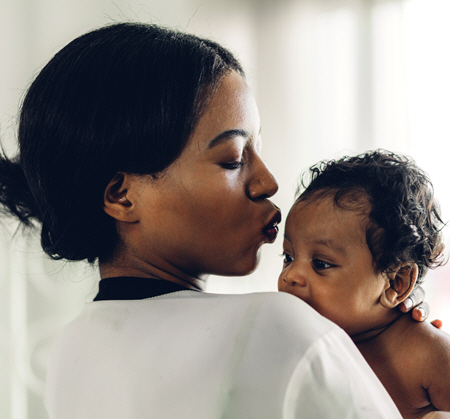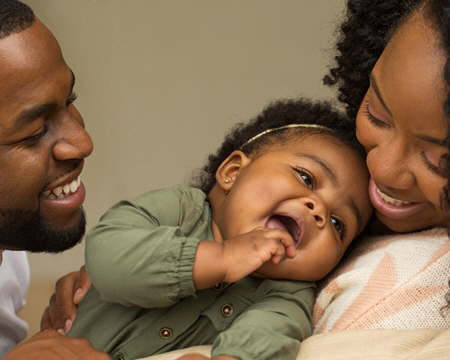 Becoming a parent: To do… or not to do?
Becoming a parent: To do… or not to do?
Are you thinking about having children?
Already have one and are thinking of adding more to the family?
Afraid of the sacrifices parenting requires?
Will we still be able to travel, go out for happy hours, and keep up with our lifestyles?
Maybe you see your friends with their children and think, “That seems horrible! Kids require so much attention. If we had kids, we wouldn’t even be able to hold a conversation… plus, we have to wrap up by 6 pm because of their bedtime?? No, thank you!”
Other days you might think, “Aw, they’re so cute. We do little in the evening, anyway. I think I could be a parent, so maybe it’s time to have a kid?”
Or, do your parents or in-laws keep staring at your belly and not-so-subtly hinting about wanting a grandchild? “We’re not getting any younger,” they say. “Yes, thank you for the reminder,” you think, “I’m not getting any younger, either!”
 Preparing for and surviving parenthood…
Preparing for and surviving parenthood…
Whether you already have children or are thinking about having children, there’s a LOT to consider.
Bringing a child into the world comes with countless decisions before they’re even born…
What if I want or have to keep working?
What will we do for daycare?
How will being out of the workforce for maternity leave affect my position?
How much do we need to save up for leave, hospital expenses, and baby expenses like diapers?
Should I breastfeed or use formula… if I use a formula, what’s the best one?
Where do they sleep when I bring them home?
With me, in the bassinet in the room, in a crib across the hall?
What do they sleep in, so they’re not too hot or too cold?
What causes SIDS?
What’s the best brand of diapers?
What if they’re colicky?
What if I have a difficult delivery and we need more help than we have?
Then there’s all the time spent preparing for what the baby needs: how to help them sleep, eat, and learn what they need based on subtle differences in cues you don’t know how to read yet.
Through it all, it’s expected that the needs of parents take a back seat – all when they’re dealing with a vast array of emotions related to these life changes. I’m not just talking about the things that immediately come to mind (like literally keeping another human alive), but changes to your identity, household roles, finances, friendships, family dynamics, marriage, job, productivity, community, and mental health!
We’re naturally equipped to be parents without preparation or training??
WHAT?! Why would anyone think that??
To drive a car, you need a license.
To become a hairdresser, you need training.
To get a job, you have to go through training AND interviews.
To keep a human alive and raise them to be relatively healthy beings?? Nothing needed… just good old-fashioned “instincts.”
It’s ludicrous and sets new parents up to feel inadequate.
 Having a child means having your needs and insecurities reflected at you.
Having a child means having your needs and insecurities reflected at you.
You might be surprised at what “comes to the surface” once you become a parent.
When you were a child, your parents may have been great: attuned, connected, and supportive of you exactly as you were. Or, they may have been horrible: disconnected, critical, minimizing, or downright abusive. They were likely somewhere in between: sometimes showing up for you… and sometimes leaving you feeling wholly inadequate.
When you transition from being the child to being the parent, all of those experiences resurface.
Your child will become the most triggering person in your life. That’s not meant to be scary. They’re not triggering because they are traumatizing you with their presence. They’re triggering because they will provide a mirror of all that you wish you had, wish you were, and wish to be. Children help us recognize our own emotions, emotional needs, and desire to feel regulated in a way no one else can.
It begins with love, and that can bring stress, pain, and sorrow.
Parenthood can be one of the most rewarding feelings in the world. The simple act of looking at your child can give you physical pain because you love them so much.
But love is only one part of parenting. Having a child has profound effects on your relationship with yourself and your partner.
Expectations…
You just lost it on your partner. You escape to the bathroom and are scrolling social media. There’s another happy couple with their baby, seeming like everything is bliss. You feel like something is wrong with you because all you want is a BREAK.
“Why can’t I just be happy?” you ask yourself. Because you are normal and social media shows people at their best moments, not their most real.
Communication…
You just had a baby and are learning their needs. You’re both sleep-deprived. Everything feels more “edgy.”
It might also feel like there’s no time to address the challenges between you two because you’re drowning trying to keep an infant alive.
You’re tired of feeling like the crazy one. Guess what… you’re not crazy. Parenting is hard on the marriage.
 Sex…
Sex…
If you just had a baby, you probably have no interest in sex. “Don’t even touch me!”
Meanwhile, your partner is feeling increasingly rejected and lonely. Now let’s add on the boundary challenges of extended family, and we have a perfect storm of disconnection between the two of you.
Your family and friendships…
Even families that mean well can act entitled to your child in a way that can be very difficult for you. “When can I come to see MY baby?” People may show up unannounced, wanting to spend time with your new baby, leaving you feeling more overwhelmed than supported.
You’re often faced with the painful reality that you don’t have as much support as you need. Asking for help has never been your strong suit. It’s lonely and adds to the growing pressure you feel to do it all yourself.
Friends may show up for you initially and then be occupied by their own families. Your friends without children may not know how to connect with you anymore. After all, you’re about to talk about sleep and poop more than you ever have before. You’re not drinking like you used to, and that 6 pm bedtime feels like the party you’ve been waiting for all day.
Relationships with family and friends change. Some changes are temporary. Others may be longer-lasting. Building the skills to identify what you need and want from these relationships before you have a baby will help you maintain the relationships that feel valuable for you and grow naturally away from those that don’t.
The majority of couples struggle after their baby is born.
Again, there is so much preparation before having the baby that the relationship gets put on the back burner.
When we are sleep-deprived and exhausted, all the normal challenges are exacerbated.
Both partners are at risk for postpartum depression and anxiety, and the shame that comes with those feelings can be insurmountable. “Shouldn’t we be filled with joy that we just had a baby?” Sure, sometimes that is true, but other times, you’re filled with resentment, guilt, sadness, and anxiety.
These are normal feelings for parents, and there is NOTHING wrong with wanting support.
 Let’s talk about how I can help you during this challenging time.
Let’s talk about how I can help you during this challenging time.
Separating fantasy from reality…
It’s normal to fantasize about what it will be like to be parents and what our children will be like. I’ll help you make the shift from fantasy (what it could be like) to accepting what is.
Fantasy: Your partners, friends, and family have impressive boundaries, just knowing what you need and asking all the right questions, so you feel fully loved and supported. Your baby sleeps through the night at 6-weeks, breastfeeds like a champ, and you’ve never felt better. Your baby is likable, agreeable, and precisely what you hoped.
Reality: You and your partner’s family members are overwhelming, telling you what to do and how to do it, spending way too much time demanding to hold your baby, and not enough time helping. Your friends decided to go on a vacation the first two weeks the baby was born, and all you see is the fun they’re having while you’re exhausted figuring out how to be a parent. Your baby hasn’t slept over two hours in a row since you came home from the hospital, and you feel like you got hit by a truck. Your baby is unpredictable and makes you feel inadequate.
Both scenarios are possible, but only one of them is more common than the other. Being prepared to accept reality and grieve your fantasies will not only mitigate anxiety and fear; it allows you to embrace each moment without second-guessing yourself or your child.
You will learn to shift from believing you should be a natural at parenting to accepting you will feel like a novice most of the time, and that is the norm.
Healing the wounds preventing connection…
Experiences from your life might dampen your ability to connect fully with yourself and your child.
The way you were raised will directly influence the way you raise your child. Humans have deep, fundamental needs to belong, explore, connect with others, and learn ourselves. Finding balance in a society that tells us time spent thinking of ourselves is “selfish” contributes to disconnection from self and others.
Somewhere along the way, we pick up stories about ourselves, commonly about why we aren’t good enough. Until that story is rewritten, it is carried around as truth. This pushes us from our actual emotions. The ability to feel and embrace rather than avoid. To navigate our emotions without getting overtaken by them is what allows for genuine connection with others.
We cannot thoroughly teach our children skills we don’t have ourselves.
Opening the lines of communication…
When you walk into my office or log into a virtual meeting, I’ll create a safe space for you and your partner (if you’re partnered) to lower some walls you’ve put up to protect yourselves.
Seeing each other’s wounds allows for deep understanding, healing, and connection. It is not an excuse for unhealthy or abusive behaviors that create long-term dysfunctional patterns. It’s the path to healing and intimacy.
Opening communication in a safe space allows for identifying patterns of reactivity and distinguishing between expressing genuine emotions and reactivity that harms the relationship.
Avoiding confrontation avoids intimacy. You are in this together and can deepen your relationship during this process.
Providing you informed support…
Instead of toughing it out or trying to figure out everything on your own, let me walk you through to the other side.
You get to be the focus during this process, not the baby. This space allows you to express your hopes, desires, fears, and doubts without worrying about judgment for expressing your feelings. Holding everything in is taking away from your love of your potential future child. Healing comes in the process of feeling seen and being someone who sees other people.
Together, we will uncover the subconscious beliefs influencing your decision to become a parent or your parenting approach. We will dramatically increase your self-awareness, allowing you to recognize your feelings, needs, and wounds that need healing so you can trust your decisions and your parenting.
Through various therapeutic approaches, such as Internal Family Systems, Cognitive-Behavioral Therapy, and Imago Therapy, we will release years of patterned responses and reprogram parts of you that keep you from having a deep connection with your child and your partner.
By sharing years of training, trial and error, and experience, we will get to the root of expectations for you and your child’s life. By recognizing realistic and unrealistic expectations, we can avoid resentment and conflict in the future.
The gap between knowing what you want, knowing better, and doing better, is the relationship you have with yourself.
 You’re not alone in this…
You’re not alone in this…
Whether you’re considering having children but have been putting it off because you don’t feel ready, good enough, or that you can do it…
Or if you already have children and need some support understanding what your child is bringing up in you…
Please reach out to me. Considering having children and parenthood is difficult enough… let me take away some burdens.
If you’re unsure if this is the right step for you, you can schedule a free 15-minute consultation to talk it through: (720) 755-7524.

